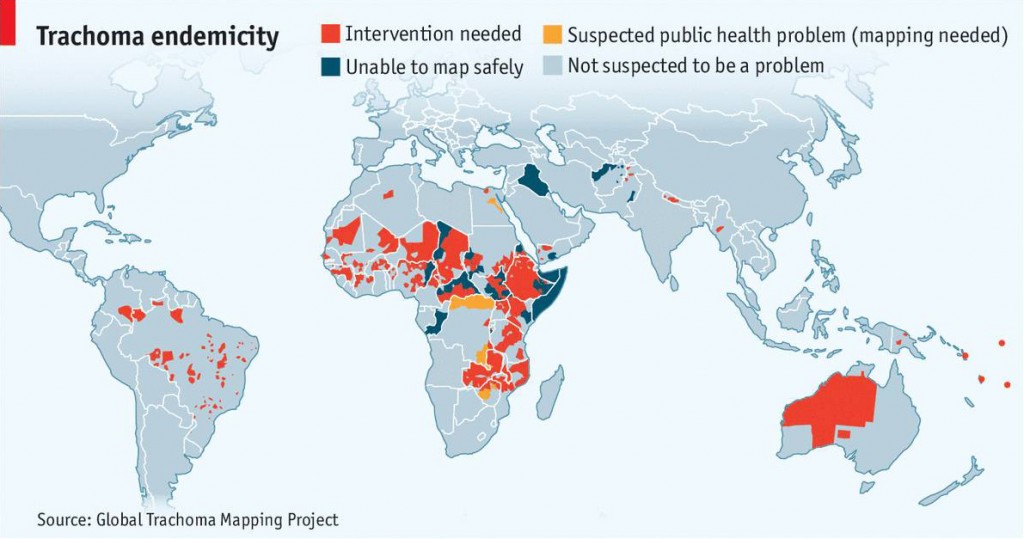New milestones in this long battle for sight
What is new coming from the Global Trachoma Mapping Project? What are the prospects for the management and eradication of this serious infection? What is its course if left untreated?
Trichiasis is the last stage of the trachomaan eye disease that rarely grabs the headlines, but is unfortunately responsible for 3% of avoidable blindness cases worldwide.
Characteristics of the infection
It is an eye infection caused by certain strains of the bacterium Chlamydia trachomatis, prevalent mainly in poor, overcrowded communities with limited access to uncontaminated water and lack of sanitation.
In fact, Chlamydia trachomatis is transmitted by direct contact (unwashed hands or soiled clothing) and through flies that have landed on the eye or nose secretions of infected persons.
The stages of the disease
In its early stages, trachoma is transmitted between children aged between 1 and 5 years and through the women who care for them.
After repeated infections, the eyelids turn inwards (trichiasis) causing severe suffering as the eyelashes scratch the surface of the cornea with each blink.
Consider that on average we blink 15-20 times a minute and, therefore, the pain from trachoma is constant and the rubbing of eyelashes on the ocular surface over time results in scarring that makes us blind.
A health emergency
At present, trachoma affects about 2.2 million people worldwide, of whom about 1.2 million are now irreversibly blind.
It is a health emergency in some 51 countries in Asia, the Middle East and, above all, Africa where the highest number of cases is concentrated.
Prevention and treatment
Trachoma is an infection that can be prevented through some basic hygiene rules, such as regular washing of the face and general personal hygiene. In addition, it can be treated pharmacologically with an antibiotic, Zithromax, and eyelid deformities induced by this disease can be surgically corrected.
Global Trachoma Mapping Project
Until now, however, it was difficult to know exactly where the main efforts to eradicate this disease were concentrated and what the results were, but in February 2016 the Global Trachoma Mapping Project (GTMP http://www.sightsavers.org/gtmp/)a true atlas of risk.
GTMP is a survey that started in December 2012 at the initiative of Sightsavers, a British charity committed to visual prevention, and with the support of over 53 organisations including 30 Ministries of Health, the London School of Hygiene & Tropical Medicine, the International Trachoma Initiative, the WTO and over 20 non-profit organisations.
The project was funded to the tune of £10.6 million by the UK government and co-funded to the tune of around £6 million by USAID.
The investigation was concluded in January 2016, after more than 550 specialist teams collected data on 2.6 million people over a period of three years to check whether they were infected.
The sample was drawn from a population of 224 million people from 29 countries considered to be at risk.
The project methodology is designed to be simple and reliable: no paper reports, but rather data collection through smartphones. In this way, data cannot be lost through rain and its quality can be continuously verified.
Furthermore, there can be no doubt as to the geographical origin of the detections, since phones can be tracked through the Global Positioning System.
There is some good news:
- Malawi, Nigeria, Tanzania and Uganda were found to have much lower rates of trachoma than expected.
- Laos and Cambodia, which have not been surveyed since the 1960s, were found to be virtually free of the disease.
- For countries where the infection is still widespread, a blanket distribution of antibiotics and education programmes on facial hygiene have been initiated.
The WTO (World Health Organisation) aspires to eliminate trachoma as a public health risk by 2020, with only a few sporadic cases to be entrusted to the care of local doctors.
It is certainly an ambitious goal but... fortune favours the bold!

